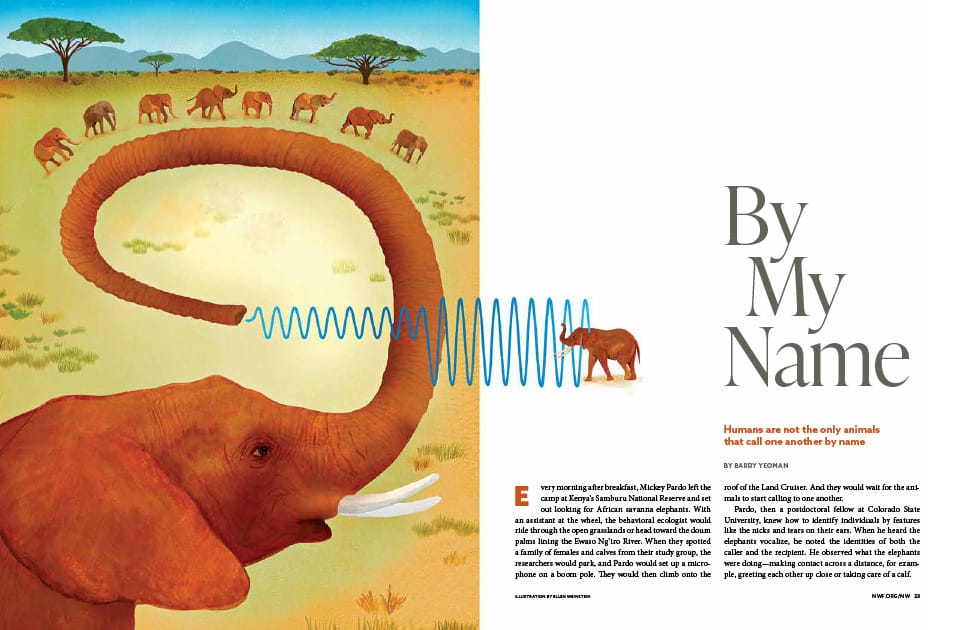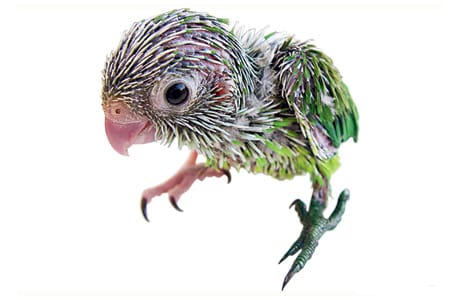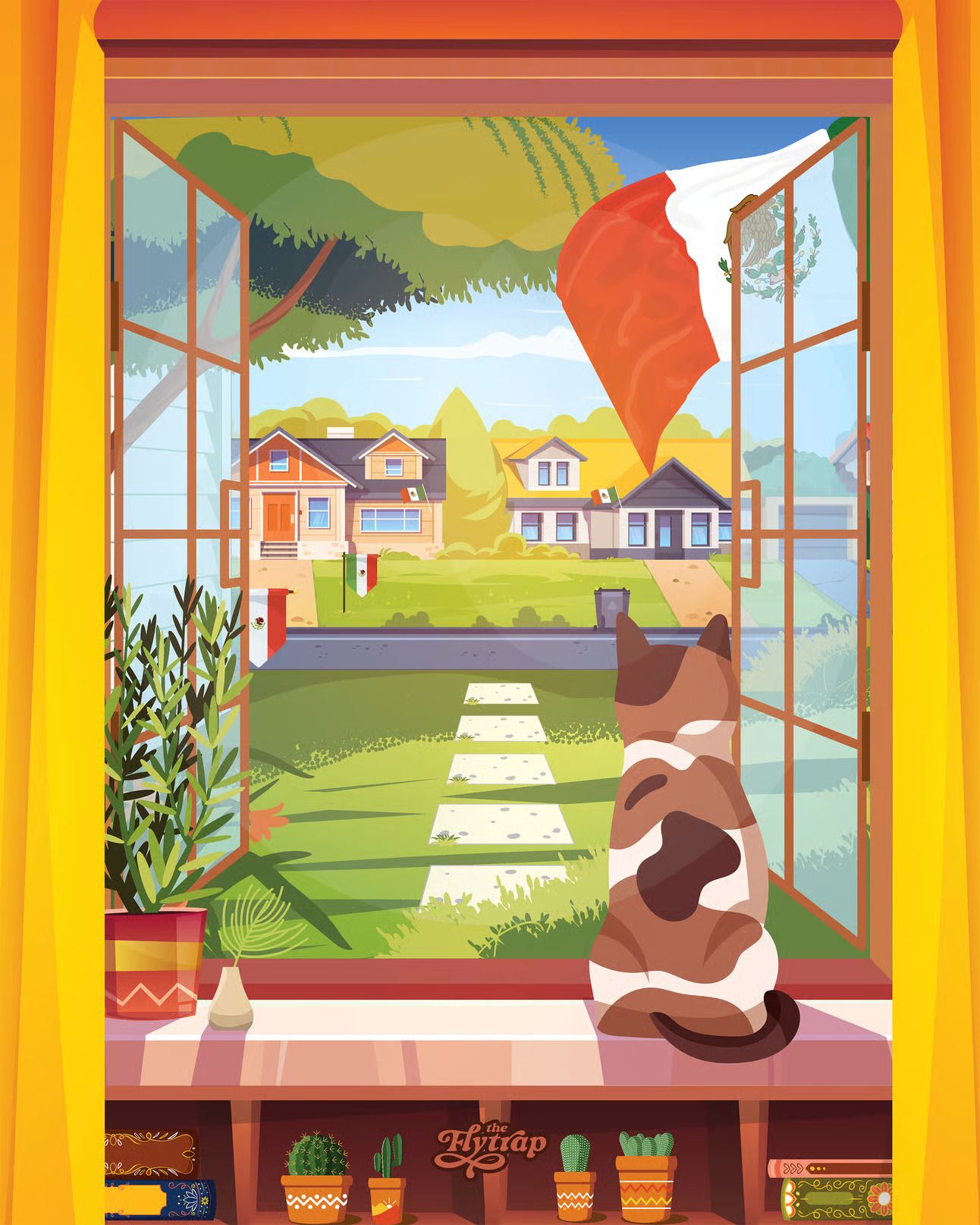- Barry Yeoman: Unabridged
- Posts
- My latest: Call me by your name
My latest: Call me by your name
Elephants do it. Marmosets do it. Even green-rumped parrotlets do it. Also: a boisterous feminist newsletter that deserves your support, an '80s punk nursery rhyme, and some great podcasts about food.

Dear friends,
We humans think we’re so special. Under the category of human exceptionalism, we’ve carved out a list of skills we have that other animals supposedly don’t. We solve complex social problems. We use language. We think abstractly. We have sex for pleasure.
It turns out that none of those skills are truly exceptional.
In the latest issue of National Wildlife, I write about one behavior that was believed to be unique to our species: calling one another by name.
It turns out that we’re not alone in this skill. Elephants do it. Marmosets do it. Bottlenose dolphins, too. And little green parrots that live in South America. The more scientists study this, the more they gain clues to the evolution of language, which is both fascinating and the source of considerable contention.
You can the story here:
I hope you enjoy and share it.
I love writing the occasional science story because it renews my sense of wonder. It opens windows into lives I’d otherwise know nothing about. And it offers me a respite from the contentious topics I often cover. When a National Wildlife staffer interviewed me for the author’s page, I told them, “Being able to report on animal communication, rather than politics, has been such a balm for my soul.” Not to mention: It feels important now to be celebrating good science.

This wild green-rumped parrotlet chick is 21 days old, the age when it will learn its signature contact call from its parents. Photo by Karl S. Berg.
What I’m up to next: Later this month, I’ll be hitting the road with my friend John Noltner, a talented documentary photographer whose A Peace of My Mind project uses storytelling and art to bridge divides. (Read about his recent trip to Northern Ireland here.) John and I will head south to interview people who are making important change in the world. The results should be online later this summer, and of course I’ll keep you posted.
What else I’ve read, international edition:
John Woodrow Cox on a Colorado farmer who was promised a federal grant to hire a Guatemalan worker—only to have the Trump administration freeze the funds as "DEI."
MacKenzie Chung Fegan’s account of being asked to leave the Michelin-starred French Laundry.
Hanif Abdurraqib’s profile of the grandmother of Juneteenth.
Dissident Chinese author Murong Xuecun on his relationship with a government censor.
Jeanne Lenzer and Shannon Brownlee’s investigation of drugs approved by the FDA on the basis of flimsy or nonexistent evidence.
Amanda Guinzburg’s chronicle of ChatGPT gone awry.
Gary Shteyngart on the world’s best loved rodent.
What else I’ve read, North Carolina edition:
Jessica Wakeman on a campaign against LGBTQ library books.
Hope Zhu on refugees stranded by the Trump administration’s policy changes.
Janine Latus on DOGE and domestic violence programs.
Where I’ve subscribed: Of the many independent media popping up, the one delighting me most is The Flytrap, a boisterous, worker-owned, feminist newsletter whose self-stated mission is "to unfuck your algorithm." Among my favorite stories: Tina Vasquez on the quiet provocation of flying the Mexican flag; Christine Grimaldi on enrolling in an online university under her father's name; Rebecca Mott on working as a bra fitter; and Ella Bainbridge on the ideology of maps. The Flytrap has a free-level subscription, but really, the full version is worth the subscription fee.

From “The Quiet Provocation of Flying the Mexican Flag,” The Flytrap. Illustration by Rommy Torrico.
What I’ve been listening to, podcast edition:
Gravy, the podcast of the Southern Foodways Alliance, has had some fine episodes lately:
Katie Jane Fernelius on how people eat when disaster strikes.
Kayla Stewart’s visit to a Black-owned distillery in Arkansas that produces sweet potato vodka.
Boyce Upholt on a seafood-labeling scandal that nabbed a beloved Mississippi restaurant. (This one was produced in partnership with the Food and Environment Reporting Network and Inc. magazine).
Eva Tesfaye on farming crawfish at a time of extreme climate.
What I’ve been listening to, 1988 punk rock edition:
(Thanks to WFUV in The Bronx for that one. Please support a public or community radio station if you can. Their funding is under threat.)
Summer’s getting intense. Find your cool. Do something that brings you meaning and helps repair the world. Remember what Vaclav Havel said about hope.
All best,
Barry Yeoman